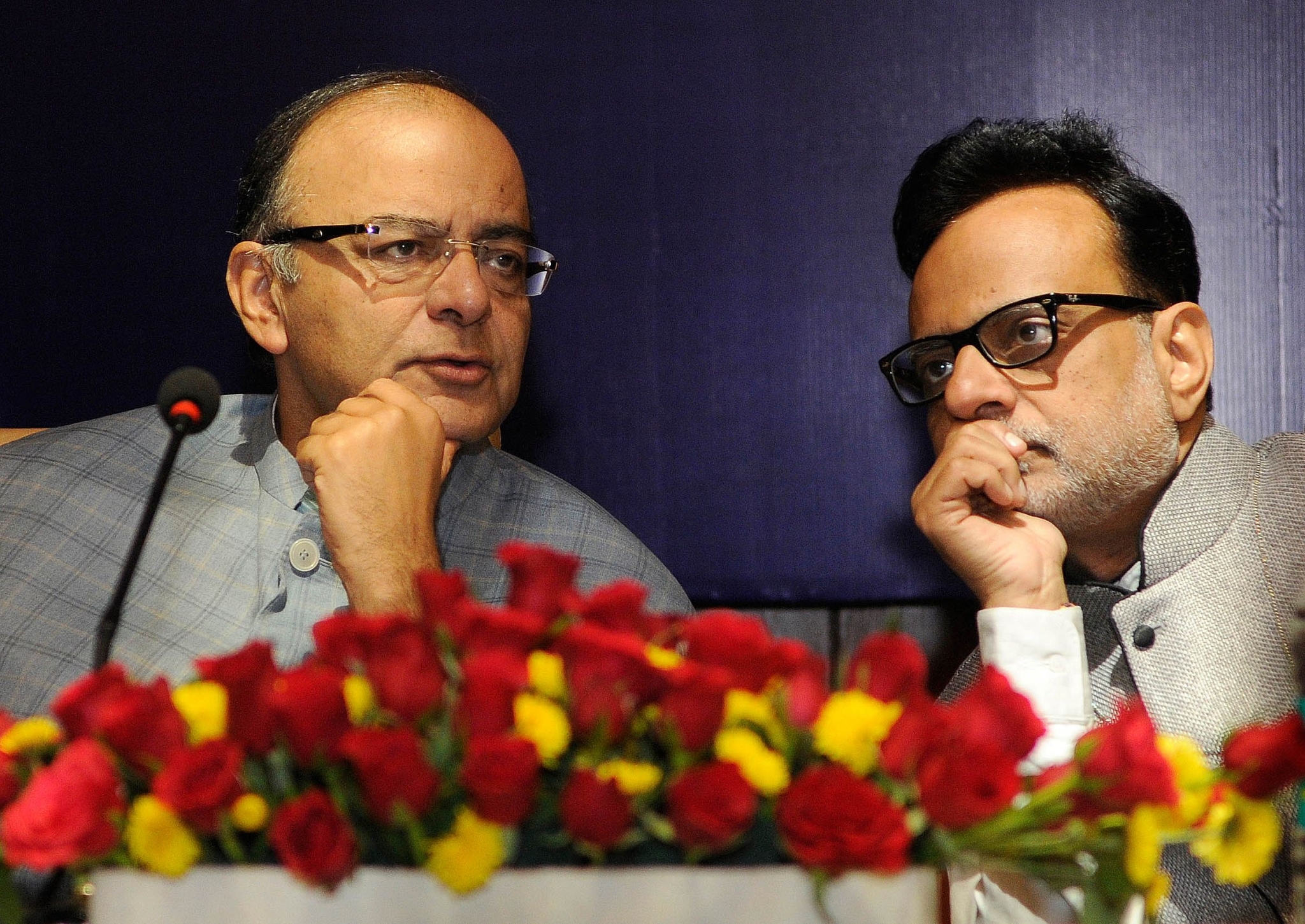Economy
Because Ease Of Doing Business Is Not Ease Of Filing Taxes
- This government has many structural reforms to its credit. But, tax reforms and tax administration are two very important structural reforms that are not only pending but have become bigger problems in the last four and half years.

Finance Minister Arun Jaitley with Revenue Secretary Finance Dr Hasmukh Adhia in New Delhi. (Sonu Mehta/Hindustan Times via GettyImages)
On 19 November the RBI Board met. RBI put out a press release. A committee is to be formed to evaluate the adequate level of revaluation and contingency reserves that RBI could hold. The RBI-government spat has moved off the headlines. India’s improved ranking in the ‘Ease of Doing Business’ dominated the headline.
Some found that the government ‘gamed’ the ranking. It is a case of ‘lose-lose’ for the government with these critics. If India had slipped in the rankings, it would be pilloried. Since the ranking went up dramatically, these worthies found that the Government of India was capable of even gaming the World Bank rankings!
If only the Government of India could game the rankings, it has some explanation to do as to why it could not improve India’s ranking in the ‘Ease of Starting a Business’ from the current level of 137.
In terms of ‘Paying Taxes’ one of the parameters in the ‘Ease of Doing Business’ rankings, India was ranked 121 in the ‘Doing Business 2019’ rankings.
In the ‘Doing Business Ranking 2018’, on ‘Paying Taxes’ parameter, India’s rank was 119. [– p. 167 of the report or p.174 of the PDF document].
India’s ‘Distance to the frontier’ in ‘Paying Taxes’ had shrunk. In other words, India has improved marginally on this parameter. India has improved to 65.36 from 65.23, the year before.
It is interesting to note that the ‘Distance to Frontier’ score was originally 66.06 for India on ‘Paying Taxes’ in the ‘Doing Business 2018’ report. It had since been revised to 65.23 and hence, 65.36 appears like a marginal improvement.
Also, the number of hours spent in paying taxes was estimated at 214 in the DB 2018 report.
But, after more data on GST payments had been obtained, this number was revised higher to 275 hours! [– see page 15]
This is what the PWC document had to say about the GST introduction process:
In DB 2019, the number of hours spent in paying taxes in Mumbai is estimated at 277.5 hours! India is doing poorly compared to South Asia (slightly only since India is the larger share of South Asia); substantially poorly compared to OECD (159 hours) and Singapore (49 hours!). According to the PWC document linked above, the global average was 237 hours in 2018.
The total taxes and contribution rate (% of profit) was 52.2 (vs.55.3 in the previous year’s report). It is good that it is declining but still on the high side. OECD average is 39.8 per cent and the best rate is 26.1 per cent.
But, more than the tax rates, the number of hours spent in filing taxes and appealing assessments has a huge monetary component. The hassle of dealing with bureaucracy has a far higher monetary and morale cost than the actual tax paid.
Directing start-ups to calculate the ‘share premium’ received as taxable income, questioning companies as to why their valuation came down in subsequent rounds of investing are clearly not ways to boost entrepreneurial and economic activity in India.
There is also the recent tax demand raised on the banking system imputing value to the free services that banks provide customers as ‘lost income’ for banks and hence ‘lost tax revenue’ for the Income Tax Department. It is, at once, a farce, a tragedy and surreal.
Banks are encouraged to concentrate on financial inclusion. Further, government wants people to transact through banking channels so that transactions could be monitored and traced, if necessary. If the tax demand is met, banks will either withdraw these services or levy higher and hidden charges elsewhere. Either way, some fraction of the public will disengage from banks.
Is this what one arm of the government wants to do to government’s policy objectives?
India’s ‘Ease of Doing Business’ rankings might have improved from 130 to 100 to 77. The improvement to 77 is supposedly based on the improvements effected in the areas of handling construction permits and foreign trade transactions. Well and good. They are necessary.
But, tax department figures in ordinary Indians’ lives – individual or commercial – on an almost daily basis. There, India has slipped and these reports tell us why.
This government has many structural reforms to its credit. Christopher Wood of CLSA in his weekly missive, ‘Greed & Fear’, has documented them well on 15 and 22 November. But, tax reforms and tax administration are two very important structural reforms that are not only pending but have become bigger problems in the last four and half years.
This piece was first published on the writer’s blog and has been republished here with permission.
Support Swarajya's 50 Ground Reports Project & Sponsor A Story
Every general election Swarajya does a 50 ground reports project.
Aimed only at serious readers and those who appreciate the nuances of political undercurrents, the project provides a sense of India's electoral landscape. As you know, these reports are produced after considerable investment of travel, time and effort on the ground.
This time too we've kicked off the project in style and have covered over 30 constituencies already. If you're someone who appreciates such work and have enjoyed our coverage please consider sponsoring a ground report for just Rs 2999 to Rs 19,999 - it goes a long way in helping us produce more quality reportage.
You can also back this project by becoming a subscriber for as little as Rs 999 - so do click on this links and choose a plan that suits you and back us.
Click below to contribute.
Latest